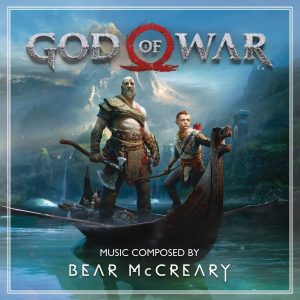God of War Original Soundtrack
 |
Album Title: God of War Original Soundtrack |
| Record Label: Sony Music Entertainment | |
| Catalog No.: 19075834412 | |
| Release Date: April 20, 2018 | |
| Purchase: Listen on Spotify |
Overview
Two years ago, we sat down with Bear McCreary at MAGfest to discuss his then-recent work on the Jack the Ripper DLC to Assassin’s Creed: Syndicate. At the end of the interview, he teased an upcoming project that was revealed that summer to be the next installment of the God of War series. This would be a big departure from the large – perhaps overcrowded – sound teams that had scored the previous games. Then again, the game itself was a departure from the previous installments. How did McCreary’s work reflect Santa Monica Studios’ reimagining of the God of War franchise?
Body
The first track on the album, “God of War”, gives us what I suppose is Kratos’ theme, a stylistic throwback to previous God of War scores. It’s also the least interesting of the main themes of the album. It’s an opening, and for better or worse, it sounds like something out of a God of War game. The theme is only a few notes long, which allows it to be easily embedded into most of the other tracks without taking over. This track’s iteration features obligatory bass vocals, a militant drum, a march-like rhythm – there are moments where it stumbles into something that may suggest an emotional swell, but for the most part, it’s a God of War overture – just not indicative of what’s to follow.
The first track is all but forgotten after the opening of the second track “Memories of Mother”, which is thankfully the meat of the score. “God of War” may be Kratos’ theme, but “Memories of Mother” is the heart of the soundtrack: a sorrowful, haunting melody that is easily manipulated into other settings, and malleable enough to fit comfortably on multiple other pieces on the score. The track itself is a small suite of the theme, with Eivør Pálsdóttir’s powerful vocals accounting for a significant percent of the emotional buildup by the end. For a longer suite, skip ahead to the track “Ashes”, which brings a full six-minute exploration of the theme to the album (in addition to a few small “God of War” thematic cameos). “Ashes” is a truly excellent track, with some wonderful development and great showcasing of the musical resources McCreary had at his disposal.
It’s fair to say that the opening of the God of War soundtrack is something of a thematic powerhouse. “Witch of the Woods” introduces a more mysterious theme, and is the first track on the album without vocals, which separates it from its predecessors (and followers). At this point, we encounter one an excellent problem to have on a soundtrack; as powerful as “Witch of the Woods” is, it’s simply eclipsed by the preceding and following pieces.
Track four of the album, “Lullaby of the Giants” introduces my favorite theme. “God of War” introduced a chorus, but “Lullaby of the Giants” is more lyrical, and here the chorus is front and center. While the track is certainly not a capella, McCreary keeps the role of the instruments fairly minimal; a booming drum haunts the track, a string section adds a few harmonies or echoed melodies, and a few bells mark the entrance and exit of the vocals. Incidentally, the structure of the piece follows a symmetrical rising and falling pattern, reflective of the mountain Kratos and Atreus want to climb in the game. “Lullaby of the Giants” opens with some bells followed by a male chorus. It is soon joined by some minimal percussion and strings; after a couple of minutes, a beautiful and unexpected soprano countermelody marks the “summit” of the piece. The track ends with the instruments fading out one by one until all that’s left are the bells that opened the piece.
These four tracks – and four themes – establish the thematic backbone of the God of War soundtrack. Most of the following pieces recall melodies from somewhere in these four opening tracks – sometimes overtly, and sometimes subtly. I’d been wondering why these four tracks are the album openers – for those who have played the game, “Ashes” is actually the track that starts the story for those playing the game – but from a listening experience, I appreciate this setup. Several tracks afterwards felt familiar in some way, because I had already been set up to recognize many of the themes that follow. “A Giant’s Prayer” combines “Lullaby of the Giants” with “Memories of Mother”, while “The Healing” uses the “Witch of the Woods” theme and “God of War”. Those who enjoy discovering cleverly embedded thematic content in soundtracks will find this album a treasure trove waiting to be explored.
Not all of the tracks follow this pattern – we have the odd battle or character theme here and there that introduces some catchy motif. “The Dragon” opens with a dramatic percussive blast and screeching strings, but falls into a call-and-response pattern between the strings and a forceful chorus that joins in, accompanied by regular drumbeats. “Mimir” has a comfortable melody, but is performed with a Renaissance flair that continuously interrupts the more somber brass sections. “Magni and Modi” is another percussion-heavy battle theme, but with a mixed meter that adds a bit of spice to what might otherwise be your typical God of War boss battle theme. “Valkyries” is another brand-new theme with an impressive two-minute build before it falls into a battle-like rhythm. The melody in this track sounds very foreign; it may just be the female chorus – which does stand out pretty starkly on this album – but the melody itself sounds almost ecclesiastical at points.
One of the most engaging battle themes shows up in “Deliverance”, a spirited track with an energetic (if a bit sinister) melody. “Deliverance” takes this theme and spins it in several different ways throughout the track, with occasional pauses for sweeping choral statements. McCreary takes his time on “Deliverance”, which tops six minutes in length while still keeping a healthy pace as one iteration of the theme fades into another. The track becomes wilder as it progresses – after four minutes, musical sirens sound in the background. The following track, “Salvation”, opens with a more morose version of the same theme (twined with wisps from “Witch of the Woods”), eventually sprouting into a powerful conglomeration of the album’s themes.
Summary
I feel as though Bear McCreary had some kind of checklist he went through when scoring this game. So much is done correctly in the soundtrack to God of War. No theme is left unturned, and the heavy sounds of the previous titles in the series have taken a backseat to the more varied sounds of this installment. Additionally, it’s refreshing to see an album that’s been as thoughtfully compiled as this one. The tracks don’t exactly reflect the exact sequence of the game, but they’re assembled in such a way that the album is easy to listen to straight through. There is no exhausting slew of heavily percussive battle themes, but instead a great mix of action, character, and pensivity. God of War gets it right.
Do you agree with the review and score? Let us know in the comments below!
5
Posted on May 11, 2018 by Emily McMillan. Last modified on May 11, 2018.













